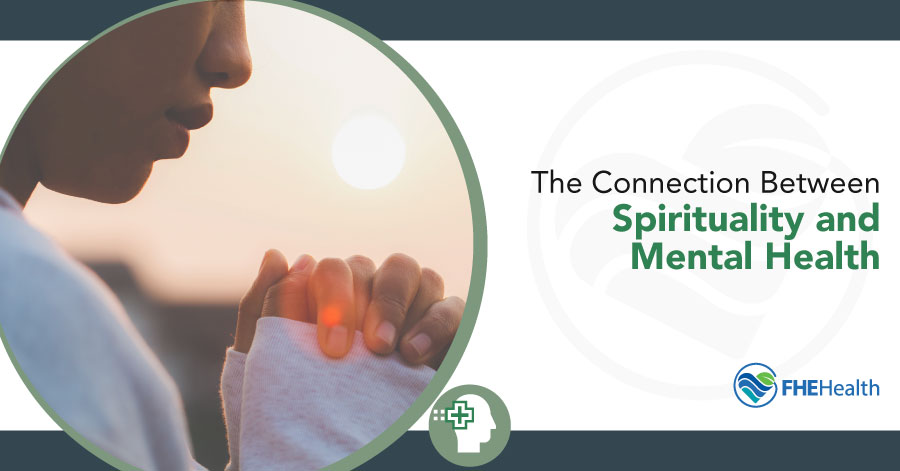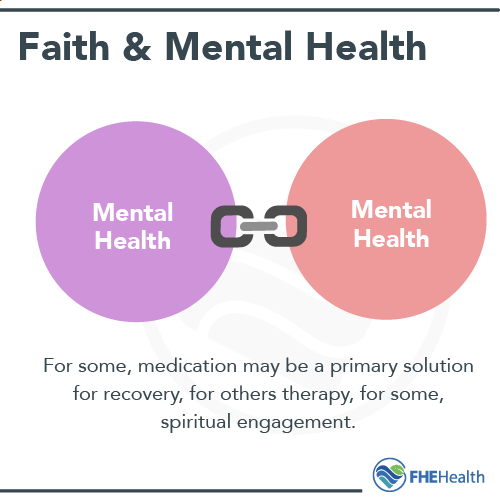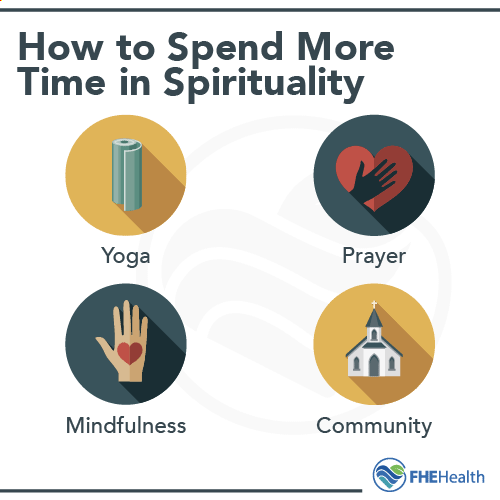
Can your spiritual beliefs support your mental health? It’s a simple enough question, (and one worth exploring regardless of where one falls on the faith-and-spirituality spectrum), but the answers can be complex.
Before mental disorders had scientific explanations, it wasn’t uncommon for someone with depression to be told to take their problems to their place of worship or to have more faith as a remedy to “feel better.” In fact, there’s still that danger in some faith-based, healing paradigms that couch mental or mood disorders as a problem of faith rather than a treatable condition.
Mental disorders affect those who are devout as well as non-believers. In a similar vein, addressing spiritual concerns during treatment helps some people but not everyone. For many people, though, spiritual beliefs and practices do serve as an important coping tool for recovery.
Mental health is not a choice, and recovery looks different for each person. But there has long been a discussion in both the scientific and faith-based communities about the connection between spirituality and mental health, whether it exists, and how it can hurt or help with recovery. According to the American Psychological Association, about 80 percent of people have some form of spiritual belief. Failing to address them in therapy is ignoring an important aspect of these people’s lives.
Is There a Connection between Faith and Mental Health?
 All across the country, centers that offer mental health and addiction therapies are embracing holistic treatment models–models that address the individual’s physical, mental, and spiritual needs. There are also treatment programs that focus more on faith than on evidence-based treatments to support recovery from a mental health or addiction problem. These faith-based programs tend to focus on one form of faith, but not always. For instance, many branches of Alcohol Anonymous (a program with Christian roots that aims for universal, spiritual appeal) are non-denominational and welcome believers and non-believers alike.
All across the country, centers that offer mental health and addiction therapies are embracing holistic treatment models–models that address the individual’s physical, mental, and spiritual needs. There are also treatment programs that focus more on faith than on evidence-based treatments to support recovery from a mental health or addiction problem. These faith-based programs tend to focus on one form of faith, but not always. For instance, many branches of Alcohol Anonymous (a program with Christian roots that aims for universal, spiritual appeal) are non-denominational and welcome believers and non-believers alike.
Treatment centers that do focus on evidence-based treatments have found that spirituality can play a role in mental health recovery, but there’s no guarantee that it will. When it comes to recovery, there are many variables. For some people, medication is the primary solution. For others, it’s a combination of counseling and alternative therapies. For some, yes, faith nurtures the recovery process in ways that are very real for those who experience the benefits of spiritual engagement.
What Is Spiritual Health?
When the spirit is at peace, a person might be said to enjoy “spiritual health.” Today, spirituality is not only governed by a religious belief system or institution. Spiritual health or spiritual wellness may be defined as an understanding of one’s life purpose, meaning, and relationships with other people. Can a sense of purpose in life safeguard against the development of anxiety or post-traumatic stress disorder? That’s not clear, but there may be some benefit in contemplating those mental health issues through a spiritual lens as a way to enhance one’s recovery journey.
Mental Health as It Relates to Spiritual Health
There have been few studies that specifically address the relationship between religion and depression or a specific mental health disorder. Yet, more than half of psychiatrists today are open to discussing matters of spirituality with patients. It’s clear that religion has had both negative and positive effects for patients with mental health conditions. Many psychiatrists have been quick to point out that religion has played a destructive role for some people. They also note that spiritual beliefs and practices provide a meaningful way to cope with some mental health symptoms.
The best treatment centers, of course, tailor treatments to meet the needs of each individual. So, a person who is not religious may find a religious focus to be intrusive and ineffectual. Many of these centers, however, define spirituality quite loosely; they’re purposely vague because they are aware that some people will have fairly rigid beliefs in an organized religion while others may view their spiritual life in the context of the natural world or through the lens of their own individualized beliefs. If these beliefs, formally organized or not, have a positive impact on a person’s ability to cope, they can offer real benefits for recovery.
In plain speak, a person who feels broken spiritually is apt to feel depressed and alone. As they begin to reconnect with their spiritual beliefs, they may feel less depressed and less lonely. It stands to reason that when a person feels well-grounded in their beliefs, they may be able to focus on the other aspects of their life that need addressing.
How Can People Invest More Time in Their Spirituality and Mental Health?
 Treatment centers that offer a more holistic treatment program often feature programs and therapies that address spirituality. For instance, restorative yoga is an activity that both believers and non-believers can benefit from. The primary focus is mindfulness. Some participants may use the reflection time to become more attuned to their spiritual lives. Someone else may use the time to quiet their mind in order to focus on the present. There’s a benefit either way.
Treatment centers that offer a more holistic treatment program often feature programs and therapies that address spirituality. For instance, restorative yoga is an activity that both believers and non-believers can benefit from. The primary focus is mindfulness. Some participants may use the reflection time to become more attuned to their spiritual lives. Someone else may use the time to quiet their mind in order to focus on the present. There’s a benefit either way.
Therapists help individuals find ways to focus more on their spiritual and mental health. They recommend exercise. They recommend taking a break from technology. They recommend a wide range of activities that encourage calmness and positivity. Stress is a major trigger for mental health symptoms, so it’s important to set aside time to escape from stress. These periods of escape can be incredibly healing. Once a person returns to their life, they may feel more in command of their feelings, stronger, and more capable of coping in healthy ways.
Have You Been Ignoring Your Spirit?
The truth is, some people are repelled by treatment programs that emphasize spiritual wellness. They may have had negative experiences with religion in the past. Yet, addressing spiritual wellness works as a therapeutic endeavor for many people. People who are spiritually inclined may benefit from a program that takes an open-ended approach to spiritual health. Programs that do not attempt to instruct a person about how or what to believe can be beneficial because each person can supply their beliefs while learning about how to connect with them better.
The benefits of spirituality in mental health are personal. In a group therapy session, one person’s way of viewing spiritual wellness is going to be different from another’s. Therapists note that when people feel more in tune with their spirit, they feel more confident and more empowered. These feelings have a decided benefit for mental health recovery. In this sense, spiritual awakening can have a positive impact on mental illness.
When working with a therapist, a person may be encouraged to participate in practices or activities that foster spiritual health. Aside from meditation and yoga, a person might be encouraged to learn other techniques that support mindfulness. Some people listen to podcasts about spiritual health or meet with support groups that feature a spiritual focus.
Mental health conditions can be complex. It’s only recently that scientists have begun to unravel the mysteries of the brain. Researchers are still studying the relationships between mental and spiritual health. What scientists do know is that people with the same condition–clinical depression, for instance–will not necessarily respond to the same therapies. What works for one person may not work for another. Focusing on their spiritual wellness works for many people recovering from a mental or mood disorder or even a substance addiction.
To learn more about how to enhance your spiritual health while obtaining therapy for a mental health condition, consult with FHE Health. It features customizable health plans that can be tailored to each individual’s needs and preferences.






